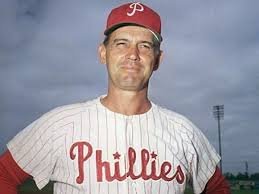Gene Mauch
Image credits: Pinterest
Some longtime baseball managers – Dusty Baker, Sparky Anderson, Joe Torre, Connie Mack, treated their players like favorite nephews.
Others treated them more like the enemy.
Gene Mauch, for instance. Pitcher Rex Barney broke in with the Brooklyn Dodgers in 1944, the same year as Mauch, a skinny infielder, and followed Mauch's career while working as the public address announcer for the Baltimore Orioles.
Rex Barney
Gene Mauch admired Leo Durocher and was determined to become a manager like him. Not the nicest guy to get along with, he was a very strict, surly guy. His contact with his players and other club employees was remote.
He had the respect of players and coaches because he had a brilliant baseball mind, but he was not a friend to any of them. He seldom said something nice about a player without adding something negative.
Like Durocher, Mauch was a .239 hitter who didn't get along with teammates. He played for six teams in seven years. In his first managing job, at Atlanta in the Southern Association, he fought with his players and with umpires. In his 26 years as a major league umpire, he was ejected 57 times, mostly for arguing balls and strikes.
So how come Mauch was seldom without a big league job, managing four teams for a total of 26 years, the most for any manager who never made it to a World Series?
Put simply, he improved every team he managed. He was an advocate of small ball: the bunt, the sacrifice. He seldom had more than one home run hitter on his team. He would take chances trying new strategies.
He sometimes used a five-man infield, bringing one of his outfielders in to play behind second base. Sometimes it worked, sometimes it didn't. He was among the first to use a double switch when he wanted to bring in a relief pitcher, replacing his second baseman at the same time so the reliever wouldn't be near the top of the next inning's batting order.
Pitcher Rex Barney closely followed Gene Mauch’s career. Image credits: Baseball History Comes Alive
His debut as a big league manager came with the 1960 Phillies, a last-place team that was even worse in 1961, losing 107 games. But two years later they were fourth and by 1964 they were in first place with a 6 ½ game lead over St. Louis and Cincinnati with 10 games to play -- and lost all 10 games while the Cardinals were 9-2. Mauch was blamed for starting 18-game winner Jim Bunning three times in the last seven games, losing them all.
The Phils slipped back into the second division and in June 1968 Mauch was fired.
Montreal became an expansion team in 1969 and immediately hired Mauch. They were a ragtag bunch of castoffs, but by 1974 he had them in the first division, winning manager of the year awards. That was as high as they finished in his seven years there.
Mauch's next stop was Minnesota, where he took over a sixth-place team and consistently finished third or fourth for five years before moving to another expansion team, the California Angels, where he came his closest to a World Series.
After finishing fifth in 1981, the Angels won the AL West in '82, but lost the ALCS in five games to the Milwaukee Brewers. Once again Mauch was criticized for his pitching decisions in the playoffs and the Angels' owner, Gene Autry, fired him.
Rehired by the Angels in 1985, he again led the team to the 1986 ALCS. This time the pitchers blew a ninth-inning 5-2 lead in Game 7 and the Red Sox won in 11.
Plagued with poor health – he was a lifetime chain smoker – Mauch retired in 1988, then returned in 1995 for one year as a bench coach at Kansas City.

